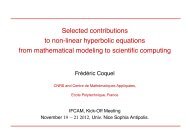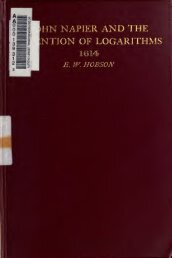The construction of the wonderful canon of logarithms
The construction of the wonderful canon of logarithms
The construction of the wonderful canon of logarithms
Create successful ePaper yourself
Turn your PDF publications into a flip-book with our unique Google optimized e-Paper software.
90 Notes.<br />
Notwithstanding <strong>the</strong> simplicity and elegance <strong>of</strong> <strong>the</strong> last <strong>of</strong> <strong>the</strong>se, it was<br />
long after Napier's time—in fact, not till <strong>the</strong> eighteenth century—that it<br />
came into general use.<br />
<strong>The</strong> subject is referred to by Mark Napier in <strong>the</strong> Memoirs,' ' pp. 451-<br />
455, and by Mr Glaisher in <strong>the</strong> Report <strong>of</strong> <strong>the</strong> 1873 Meeting <strong>of</strong> <strong>the</strong><br />
British Association, Transactions <strong>of</strong> <strong>the</strong> Sections, p. 16.<br />
On <strong>the</strong> Occurrence <strong>of</strong> a Mistake in <strong>the</strong> Computation<br />
<strong>of</strong> <strong>the</strong> Second Table ; with an Enquiry into<br />
<strong>the</strong> Accuracy <strong>of</strong> Napier's Method <strong>of</strong> Computing his<br />
Logarithms.<br />
It is evident that a mistake must somewhere have occurred in <strong>the</strong><br />
computation <strong>of</strong> <strong>the</strong> Second table, since <strong>the</strong> last proportional <strong>the</strong>rein<br />
is given (sec. 17) as 9995001.222927, whereas on trial it will be found<br />
to be 9995001.224804.<br />
This mistake introduced an error into <strong>the</strong> <strong>logarithms</strong> <strong>of</strong> <strong>the</strong> Radical<br />
table, as <strong>the</strong> logarithm <strong>of</strong> <strong>the</strong> first proportional in that table is deduced<br />
from <strong>the</strong> logarithm <strong>of</strong> <strong>the</strong> last proportional in <strong>the</strong> Second table by finding<br />
<strong>the</strong> limits <strong>of</strong> <strong>the</strong>ir difierence. But <strong>the</strong>se limits are obtained from <strong>the</strong><br />
proportionals <strong>the</strong>mselves, and, as shown above, one <strong>of</strong> <strong>the</strong>se proportionals<br />
was incorrect : <strong>the</strong> limits <strong>the</strong>refore are incorrect, and consequently<br />
<strong>the</strong> logarithm <strong>of</strong> <strong>the</strong> first proportional in <strong>the</strong> Radical table.<br />
We see <strong>the</strong> effect <strong>of</strong> this in <strong>the</strong> logarithm <strong>of</strong> <strong>the</strong> last proportional in<br />
<strong>the</strong> Radical table, which is given (sec. 47) as 6934250.8, whereas it<br />
should be 6934253.4, <strong>the</strong> given logarithm thus being less than <strong>the</strong> true<br />
logarithm by 2.6, or ra<strong>the</strong>r more than a three millionth part.<br />
<strong>The</strong> <strong>logarithms</strong> as published in <strong>the</strong> original Canon are affected by <strong>the</strong><br />
above mistake, and also, as mentioned in sec. 60, by <strong>the</strong> imperfection<br />
<strong>of</strong> <strong>the</strong> table <strong>of</strong> sines.<br />
It seems desirable, <strong>the</strong>refore, to enquire whe<strong>the</strong>r<br />
in addition any error might have been introduced by <strong>the</strong> method <strong>of</strong><br />
computation employed.<br />
Before entering on this enquiry, we should premise that in comparing<br />
Napier's <strong>logarithms</strong> with those to <strong>the</strong> base e~^ (which is <strong>the</strong> base required<br />
by his<br />
reasoning, though <strong>the</strong> conception <strong>of</strong> a base was not formally<br />
known to him), it must be kept in view that in making radius<br />
10,000,000


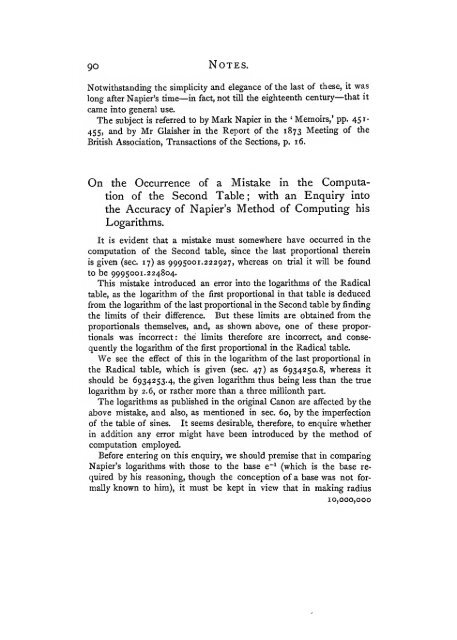
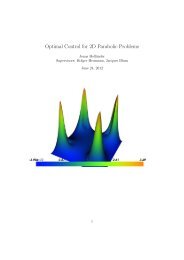
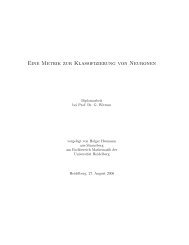
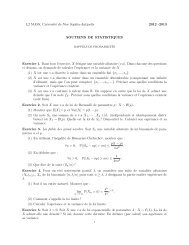
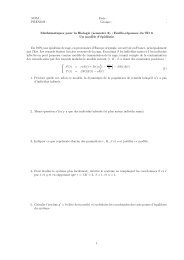
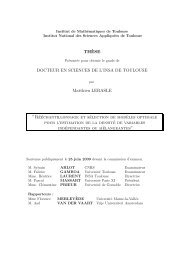

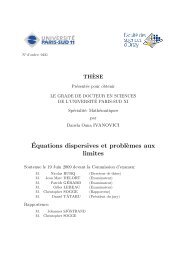
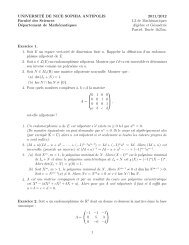
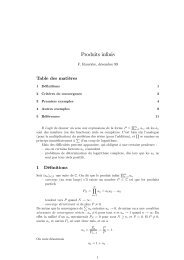
!['eries enti\`eres (+ [D78 Th d'Abel angulaire])](https://img.yumpu.com/14067031/1/184x260/eries-entieres-d78-th-dabel-angulaire.jpg?quality=85)
